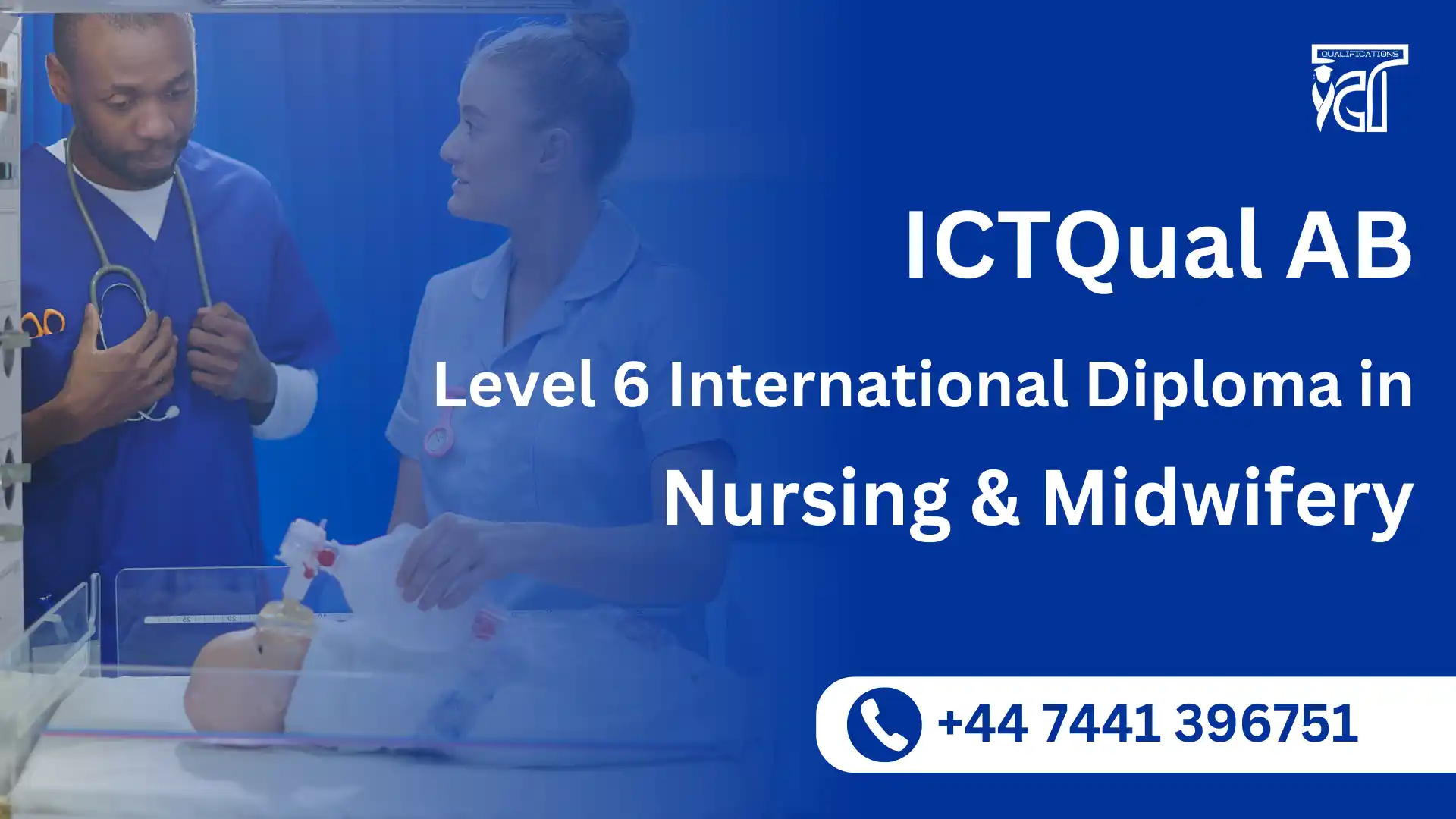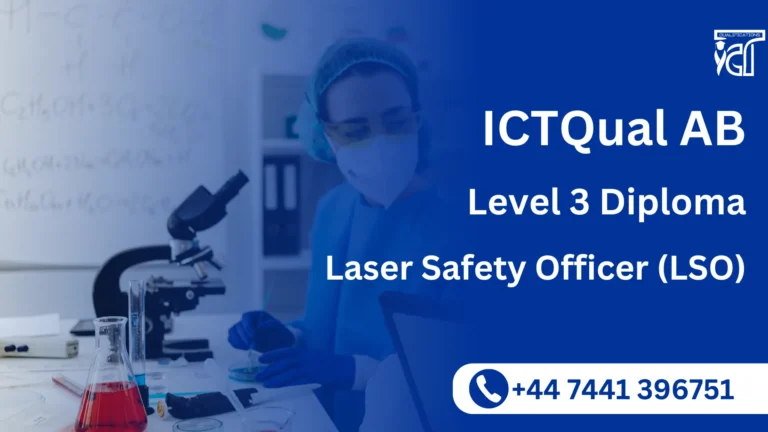The ICTQual AB Level 6 International Diploma in Nursing & Midwifery is a comprehensive and professionally-focused programme designed to equip learners with the advanced knowledge, clinical skills, and leadership capabilities required in modern healthcare. Spanning three years and comprising 360 credits, this Level 6 diploma combines rigorous theoretical learning with practical, hands-on experience, preparing learners to excel in diverse healthcare settings and meet the evolving demands of patient care.
This internationally recognised qualification is suitable for both fresh learners aspiring to start a career in nursing and midwifery, as well as experienced healthcare professionals seeking to formalise or enhance their expertise. Learners will develop proficiency in clinical nursing, patient care, midwifery practices, healthcare management, and evidence-based medical procedures, alongside critical skills in problem-solving, communication, and ethical decision-making. The programme emphasises practical application and professional development, ensuring learners are prepared to deliver safe, effective, and compassionate care in a variety of healthcare environments.
Graduates of this diploma are well-positioned for rewarding careers in nursing and midwifery, including roles such as Registered Nurse, Midwife, Clinical Nurse Specialist, Healthcare Coordinator, or Nurse Manager. Beyond clinical expertise, learners gain leadership, critical thinking, and strategic planning skills, enabling them to manage teams, improve healthcare delivery, and contribute to policy development. Completing this Level 6 internationally recognised qualification provides learners with enhanced employability, professional credibility, and opportunities for further academic progression, empowering them to make a meaningful impact in the global healthcare sector.
ICTQual AB Level 6 International Diploma in Nursing & Midwifery
This qualification, the ICTQual AB Level 6 International Diploma in Nursing & Midwifery 360 Credits – Three Years, consists of 36 mandatory units.
Year 1: Foundational Knowledge
- Introduction to Nursing and Midwifery Practice
- Fundamentals of Human Anatomy and Physiology
- Principles of Microbiology and Infection Control
- Foundations of Pharmacology and Medication Safety
- Professional Ethics and Legal Frameworks in Healthcare
- Communication Skills for Healthcare Professionals
- Health Promotion and Public Health Basics
- Psychology and Sociology in Healthcare
- Nutrition, Dietetics, and Patient Wellbeing
- Basic Clinical Skills and Patient Care Techniques
- First Aid and Emergency Response in Healthcare
- Introduction to Research and Evidence-Based Practice
Year 2: Intermediate Proficiency
- Adult Nursing and Clinical Care
- Maternal Health and Midwifery Principles
- Child and Adolescent Health Nursing
- Mental Health Nursing and Psychiatric Care
- Community Health Nursing and Primary Care
- Pathophysiology and Clinical Diagnostics
- Advanced Pharmacology and Therapeutics
- Infection Prevention and Control in Healthcare Settings
- Health Assessment and Clinical Decision Making
- Nursing Informatics and Digital Healthcare Systems
- Leadership and Teamwork in Healthcare Practice
- Applied Research Methods in Nursing and Midwifery
Year 3: Advanced Specialization and Application
- Advanced Adult Nursing and Critical Care
- Midwifery Practice: Labour, Delivery, and Postnatal Care
- Paediatric and Neonatal Nursing
- Geriatric Nursing and Palliative Care
- Advanced Mental Health and Counselling in Nursing
- Global Health Issues and Healthcare Policy
- Advanced Clinical Skills and Patient Safety
- Healthcare Management and Leadership Strategies
- Quality Improvement and Risk Management in Healthcare
- Professional Development and Reflective Practice in Nursing
- Dissertation / Research Project in Nursing & Midwifery
- Clinical Placement / Practical Competency Assessment
Learning Outcomes for the Level 6 International Diploma in Nursing & Midwifery 360 Credits – Three Years:
Year 1: Foundational Knowledge
By the end of Year 1, learners will be able to:
Introduction to Nursing and Midwifery Practice
- Explain the roles and responsibilities of nurses and midwives in healthcare settings.
- Apply foundational nursing principles in basic patient care.
- Demonstrate professional conduct aligned with healthcare standards.
Fundamentals of Human Anatomy and Physiology
- Describe the structure and function of major human body systems.
- Relate anatomical and physiological knowledge to patient care.
- Recognise normal versus abnormal body functions relevant to nursing.
Principles of Microbiology and Infection Control
- Identify common pathogens and their modes of transmission.
- Apply infection prevention and control measures in clinical practice.
- Evaluate the impact of microbiological knowledge on patient safety.
Foundations of Pharmacology and Medication Safety
- Explain the principles of pharmacology and drug administration.
- Demonstrate safe medication handling and administration practices.
- Monitor and evaluate patient responses to medications.
Professional Ethics and Legal Frameworks in Healthcare
- Apply ethical principles in clinical decision-making.
- Understand healthcare legislation affecting nursing and midwifery practice.
- Maintain confidentiality and professional responsibility in all patient interactions.
Communication Skills for Healthcare Professionals
- Demonstrate effective communication with patients and healthcare teams.
- Apply active listening and empathetic skills in patient care.
- Document patient information accurately and professionally.
Health Promotion and Public Health Basics
- Explain principles of health promotion and disease prevention.
- Apply public health strategies to support community wellbeing.
- Evaluate interventions for effectiveness in promoting health outcomes.
Psychology and Sociology in Healthcare
- Explain the influence of psychological and social factors on patient health.
- Apply basic counselling techniques to support patients.
- Recognise the impact of social determinants on healthcare delivery.
Nutrition, Dietetics, and Patient Wellbeing
- Assess nutritional needs and dietary requirements of patients.
- Apply knowledge of dietetics in patient care planning.
- Promote healthy eating and lifestyle practices for improved wellbeing.
Basic Clinical Skills and Patient Care Techniques
- Perform essential clinical procedures safely and accurately.
- Demonstrate patient handling and care techniques with empathy.
- Apply infection control and safety standards in clinical practice.
First Aid and Emergency Response in Healthcare
- Respond effectively to common medical emergencies.
- Apply first aid procedures in clinical settings.
- Demonstrate critical decision-making in emergency care situations.
Introduction to Research and Evidence-Based Practice
- Explain the importance of evidence-based practice in healthcare.
- Apply basic research methods to clinical questions.
- Evaluate research findings to support nursing and midwifery practice.
Year 2: Intermediate Proficiency
By the end of Year 2, learners will be able to:
Adult Nursing and Clinical Care
- Provide comprehensive nursing care for adult patients.
- Assess and monitor patient conditions using clinical tools.
- Develop care plans addressing patient-specific needs.
Maternal Health and Midwifery Principles
- Apply principles of midwifery in prenatal, labour, and postnatal care.
- Monitor maternal and foetal wellbeing using clinical assessments.
- Support safe childbirth and promote maternal health education.
Child and Adolescent Health Nursing
- Provide age-appropriate care for children and adolescents.
- Assess growth, development, and health status accurately.
- Implement interventions promoting child and adolescent wellbeing.
Mental Health Nursing and Psychiatric Care
- Recognise common mental health disorders and their clinical presentations.
- Apply therapeutic communication and counselling techniques.
- Deliver safe, compassionate mental health care in clinical settings.
Community Health Nursing and Primary Care
- Assess community health needs and resources.
- Plan and deliver primary care interventions for diverse populations.
- Evaluate the impact of community health initiatives on patient outcomes.
Pathophysiology and Clinical Diagnostics
- Explain disease processes and their physiological effects.
- Apply diagnostic reasoning to patient assessment.
- Interpret laboratory and clinical findings to inform care planning.
Advanced Pharmacology and Therapeutics
- Analyse pharmacological principles in specialised clinical contexts.
- Apply safe medication management in complex care scenarios.
- Evaluate therapeutic outcomes and adjust care plans accordingly.
Infection Prevention and Control in Healthcare Settings
- Implement advanced infection control protocols.
- Evaluate effectiveness of hygiene and sterilisation procedures.
- Promote safe practices for patients and healthcare teams.
Health Assessment and Clinical Decision Making
- Conduct comprehensive patient assessments.
- Integrate assessment data to make informed clinical decisions.
- Prioritise care based on patient needs and risk factors.
Nursing Informatics and Digital Healthcare Systems
- Use digital tools for patient record management and reporting.
- Apply informatics to support clinical decision-making.
- Evaluate the benefits and limitations of digital healthcare systems.
Leadership and Teamwork in Healthcare Practice
- Demonstrate effective leadership in clinical teams.
- Apply teamwork strategies to improve patient care.
- Resolve conflicts and promote collaboration within healthcare settings.
Applied Research Methods in Nursing and Midwifery
- Design and implement small-scale research projects.
- Analyse and interpret clinical data using research methods.
- Apply research findings to improve practice outcomes.
Year 3: Advanced Specialization and Application
By the end of Year 3, learners will be able to:
Advanced Adult Nursing and Critical Care
- Provide specialised care for critically ill adult patients.
- Monitor complex patient conditions and respond to emergencies.
- Develop advanced care plans to support recovery and rehabilitation.
Midwifery Practice: Labour, Delivery, and Postnatal Care
- Manage labour and delivery safely and effectively.
- Provide postnatal care and support for mothers and newborns.
- Apply evidence-based interventions to promote maternal and neonatal health.
Paediatric and Neonatal Nursing
- Deliver specialised care for neonates and children.
- Assess developmental milestones and monitor growth and health.
- Implement interventions to support paediatric recovery and wellbeing.
Geriatric Nursing and Palliative Care
- Assess and manage complex needs of elderly patients.
- Provide compassionate end-of-life and palliative care.
- Promote quality of life through tailored care plans.
Advanced Mental Health and Counselling in Nursing
- Deliver therapeutic interventions for complex mental health conditions.
- Apply advanced counselling techniques to support patient wellbeing.
- Evaluate outcomes and adjust care strategies accordingly.
Global Health Issues and Healthcare Policy
- Analyse global health challenges and their impact on nursing practice.
- Apply healthcare policies to clinical and community settings.
- Promote public health initiatives at local and international levels.
Advanced Clinical Skills and Patient Safety
- Perform advanced clinical procedures competently.
- Identify and mitigate patient safety risks.
- Apply evidence-based strategies to enhance patient care outcomes.
Healthcare Management and Leadership Strategies
- Implement leadership strategies in healthcare organisations.
- Manage resources and personnel effectively.
- Evaluate operational efficiency and implement quality improvement initiatives.
Quality Improvement and Risk Management in Healthcare
- Apply quality improvement frameworks in clinical practice.
- Identify and assess risks to patient safety.
- Implement corrective actions to enhance care quality.
Professional Development and Reflective Practice in Nursing
- Evaluate personal and professional performance through reflection.
- Identify areas for continuing professional development (CPD).
- Apply learning to improve clinical practice and decision-making.
Dissertation / Research Project in Nursing & Midwifery
- Design and conduct independent research in a nursing or midwifery area.
- Analyse data and interpret findings to draw evidence-based conclusions.
- Present research outcomes in a professional report.
Clinical Placement / Practical Competency Assessment
- Apply theoretical knowledge in real-world clinical environments.
- Demonstrate practical competence across a range of nursing and midwifery procedures.
- Reflect on clinical experiences to enhance professional growth and patient care.
The ICTQual AB Level 6 International Diploma in Nursing & Midwifery equips learners with advanced clinical, managerial, and leadership skills, enabling them to deliver high-quality patient care and thrive in healthcare environments globally.
1. Advanced Clinical Knowledge
- Master nursing practices, midwifery care, patient assessment, and healthcare procedures.
- Gain proficiency in maternal and child health, adult care, and emergency response.
- Understand infection control, pharmacology, and evidence-based healthcare.
- Develop skills in patient safety, clinical decision-making, and ethical practice.
- Apply theoretical concepts to real-world clinical scenarios.
2. Career Advancement Opportunities
- Prepare for roles such as Registered Nurse, Midwife, Clinical Nurse Specialist, Healthcare Coordinator, or Nurse Manager.
- Enhance employability in hospitals, clinics, community healthcare, and maternal care services.
- Strengthen practical skills for team leadership and healthcare project management.
- Build competencies for specialist roles and senior management positions.
- Access international career opportunities in nursing and midwifery.
3. Professional Development and Recognition
- Earn a Level 6 internationally recognised diploma.
- Formalise prior experience for professionals seeking recognition.
- Develop leadership, strategic planning, and healthcare management skills.
- Gain confidence in delivering safe and effective care.
- Establish a foundation for continuous professional growth and lifelong learning.
4. Practical and Industry-Focused Skills
- Apply knowledge in clinical placements and healthcare simulations.
- Strengthen problem-solving, analytical, and critical thinking abilities.
- Gain experience in patient monitoring, care planning, and medical documentation.
- Build teamwork and communication skills for multidisciplinary healthcare teams.
- Prepare for real-world challenges in diverse healthcare environments.
5. Long-Term Benefits
- Enhanced career prospects and employability in nursing and midwifery.
- Access to advanced studies, specialisations, and professional certifications.
- Contribute to improved healthcare delivery and patient outcomes.
- Build professional credibility and clinical expertise.
- Prepare for leadership positions in healthcare management and policy development.
The ICTQual AB Level 6 International Diploma in Nursing & Midwifery equips learners with advanced clinical, managerial, and leadership skills, enabling them to deliver high-quality patient care and thrive in healthcare environments globally.
1. Advanced Clinical Knowledge
- Master nursing practices, midwifery care, patient assessment, and healthcare procedures.
- Gain proficiency in maternal and child health, adult care, and emergency response.
- Understand infection control, pharmacology, and evidence-based healthcare.
- Develop skills in patient safety, clinical decision-making, and ethical practice.
- Apply theoretical concepts to real-world clinical scenarios.
2. Career Advancement Opportunities
- Prepare for roles such as Registered Nurse, Midwife, Clinical Nurse Specialist, Healthcare Coordinator, or Nurse Manager.
- Enhance employability in hospitals, clinics, community healthcare, and maternal care services.
- Strengthen practical skills for team leadership and healthcare project management.
- Build competencies for specialist roles and senior management positions.
- Access international career opportunities in nursing and midwifery.
3. Professional Development and Recognition
- Earn a Level 6 internationally recognised diploma.
- Formalise prior experience for professionals seeking recognition.
- Develop leadership, strategic planning, and healthcare management skills.
- Gain confidence in delivering safe and effective care.
- Establish a foundation for continuous professional growth and lifelong learning.
4. Practical and Industry-Focused Skills
- Apply knowledge in clinical placements and healthcare simulations.
- Strengthen problem-solving, analytical, and critical thinking abilities.
- Gain experience in patient monitoring, care planning, and medical documentation.
- Build teamwork and communication skills for multidisciplinary healthcare teams.
- Prepare for real-world challenges in diverse healthcare environments.
5. Long-Term Benefits
- Enhanced career prospects and employability in nursing and midwifery.
- Access to advanced studies, specialisations, and professional certifications.
- Contribute to improved healthcare delivery and patient outcomes.
- Build professional credibility and clinical expertise.
- Prepare for leadership positions in healthcare management and policy development.
Completing the Level 6 International Diploma in Nursing & Midwifery opens pathways for academic advancement and career growth.
1. Academic Progression
- Progress to Level 7 Diplomas in Nursing, Healthcare Leadership, or Clinical Management.
- Enrol in Master’s programmes in Nursing, Midwifery, or Healthcare Administration.
- Access specialist certifications in maternal care, emergency nursing, or healthcare management.
- Build a foundation for research or advanced professional studies.
- Prepare for continuous professional development.
2. Career Advancement
- Opportunities as Registered Nurse, Midwife, Clinical Nurse Specialist, Nurse Manager, or Healthcare Coordinator.
- Work in hospitals, clinics, community healthcare, and maternal care services.
- Manage healthcare teams, patient care projects, and clinical initiatives.
- Prepare for senior, specialist, or leadership roles.
- Enhance global employability and professional credibility.
Entry Requirements
To ensure learners are fully prepared for the rigours of the Level 6 International Diploma in Nursing & Midwifery, the programme has clear entry criteria that balance academic readiness, professional experience, and language proficiency.
1. Minimum Age
- Learners must be 18 years or older at the time of enrolment.
- This ensures adequate maturity and readiness for professional healthcare practice.
2. Educational Background
- Level 5 Diploma or equivalent in nursing, midwifery, or a related healthcare field.
- Understanding of basic human anatomy, physiology, and healthcare principles is recommended.
- Applicants from diverse healthcare backgrounds may also be considered, provided they meet other entry requirements.
3. Professional Experience
- Route 1 – Experienced Professionals: Minimum six years of verifiable experience in nursing, midwifery, or healthcare.
- Experience should demonstrate competence in clinical practice, patient care, or healthcare management.
- Route 2 – Fresh Learners: No prior professional experience required. Learners must complete 36 structured assignments covering all core units.
4. Language Proficiency
- Competence in English is essential for understanding course materials and completing assignments.
- Recommended: IELTS 5.5 or equivalent for non-native English speakers.
- Effective written and spoken communication is critical for clinical documentation and patient interaction.
Register Now
Qualification Process
Qualification Process for the ICTQual AB Level 6 International Diploma in Nursing & Midwifery
- Self-Assessment:
Begin by evaluating your eligibility to ensure you meet the qualification requirements, including work experience, knowledge, and language proficiency. - Registration:
Complete your registration by submitting the required documents, including a scanned copy of a valid ID, and paying the registration fee. - Induction:
An assessor will conduct an induction to confirm your eligibility for the course and explain the evidence requirements. If you do not meet the criteria, your registration will be cancelled, and the fee will be refunded. - Assignments & Evidence Submission:
Provide all assignments and the necessary evidence based on the assessment criteria outlined in the course. If you are unsure of the required evidence, consult with the assessor for guidance on the type and nature of evidence needed. - Feedback and Revision:
The assessor will review your submitted evidence and provide feedback. Evidence that meets the criteria will be marked as “Criteria Met,” while any gaps will be identified. You will be asked to revise and resubmit if needed. - Competence Evidence:
Submit final evidence demonstrating that all learning outcomes have been met. This evidence will be marked as “Criteria Met” by the assessor once it is satisfactory. - Internal Quality Assurance (IQA):
The Internal Quality Assurance Verifier (IQA) will review your evidence to ensure consistency, quality, and compliance with standards. - External Verification:
The IQA will submit your portfolio to ICTQUAL AB External Quality Assurance Verifiers (EQA) for final confirmation. The EQA may contact you directly to verify the authenticity of your evidence. - Certification:
Upon successful completion of all checks, ICTQUAL AB will issue your official certificate, confirming that you have attained the ICTQual AB Level 6 International Diploma in Nursing & Midwifery.







